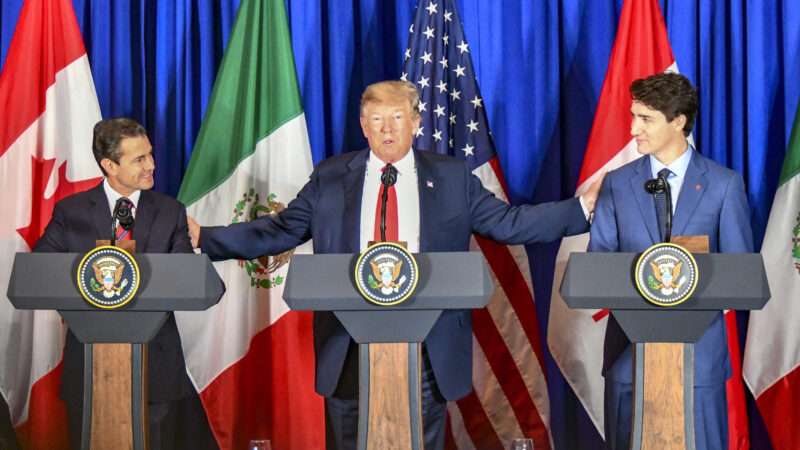
Okay, so we're doing this. President-elect Donald Trump says in no uncertain terms that he'll seek to raise taxes on imports immediately after taking the oath of office.
"On January 20, as one of my many first executive orders, I will sign all necessary documents to charge Mexico and Canada a 25% tariff on ALL products coming into the United States," Trump posted Monday night on Truth Social.
In the statement, Trump said the tariffs would be issued in response to "thousands of people…pouring through" the border from America's two neighbors, and that the tariffs would remain in effect until Mexico and Canada take steps to stop the flow of drugs and migrants. "Until such time as they do, it's time for them to pay a very big price," Trump concluded.
In a separate post, Trump pledged 10 percent tariffs on all imports from China—to be added on top of the tariffs he'd already hiked during his first term
One might object to the idea that it makes any sense at all to solve the issue of undocumented border crossings with tariffs (it doesn't), or address the flow of illegal drugs with taxes on legally imported goods (it really doesn't). Even so, the most striking thing about Monday's announcement is that Trump seemingly still does not understand it will be Americans who will foot the bill for any new tariffs.
The threatened tariffs on imports from Canada and Mexico would be a $210 billion tax increase. Imposing them would mean higher prices for many fresh fruits and vegetables currently imported from Mexico, and higher prices for crude oil imported from Canada, among other things.
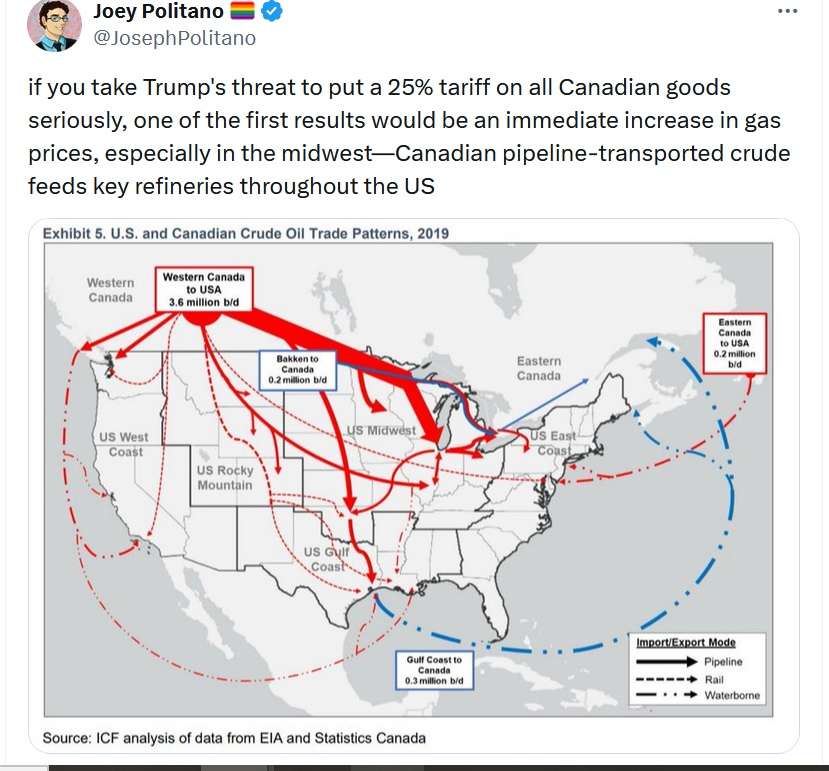 (Source: X.com)
(Source: X.com) 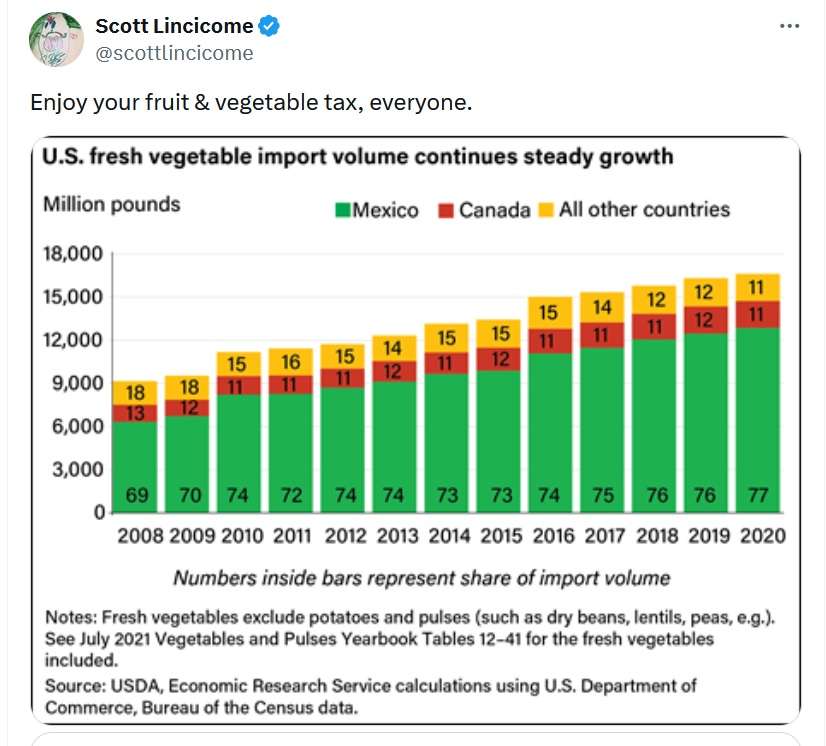 (Source: X.com (https://x.com/scottlincicome/status/1861197278473581031))
(Source: X.com (https://x.com/scottlincicome/status/1861197278473581031)) Good thing Americans aren't too sensitive about prices at the grocery store or gas pump right now!
What about the USMCA? The new tariffs would probably violate the United States-Mexico-Canada Agreement (USMCA), the trade deal Trump negotiated during his first term. Breaking the agreement would likely set off a continent-wide trade war that jeopardizes $1.5 trillion in annual trade, The Washington Post reports.
"If Trump follows through with imposing immediate and unilateral tariffs, this would mean 'going nuclear' on USMCA," Alberto Villarreal, managing director of Nepanoa, a consulting firm that helps companies manage cross-border trade, told The Wall Street Journal.
Already trying to explain away price hikes. Scott Bessent, Trump's pick to be Treasury Secretary, is trying to get ahead of the tariff news cycle. In an interview on Saturday, he claimed that new tariffs wouldn't trigger a return to higher inflation. "Tariffs can't be inflationary because if the price of one thing goes up—unless you give people more money—then they have less money to spend on the other thing, so there is no inflation," Bessent told Larry Kudlow.
In the strictest sense of the words, Bessent is right about inflation, which is always a monetary phenomenon. Tariffs operate in the realm of fiscal policy, but the outcome will look pretty similar.
Think about it like this. There are two ways for consumers' purchasing power to decline. One way is for the dollar to become less valuable, so that you have to spend more dollars to buy the same amount of goods. That's inflation, and anyone who has been to the grocery store in the past few years is familiar with it.
The second way is for the goods themselves to become more costly, which is what happens when tariffs are imposed. The end result is the same: You have to spend more dollars to buy the same amount of stuff as before. And economists are already warning that tariffs will cause prices to rise, particularly at the grocery store.
In essence, Bessent is saying that Americans won't get poorer because of inflation, but that they will get poorer ("they have less money to spend") because the Trump administration is determined to raise taxes on a lot of the things Americans buy. That might be a meaningful distinction in an economics class, but I doubt the difference will matter much to consumers already fed up with years of price increases. Good luck, babe!
Is it all a bluff? Tariffs are not, thankfully, implemented via presidential social media post, and we're still nearly two months away from Trump being in a position to do anything more substantial. That's led some observers to conclude that Monday's threats are merely the opening salvo in what Trump hopes will be another round of negotiations over trade policy—although he seems to be putting immigration and the war on drugs into the mix too.
"Investors don't entirely believe the levies will wind up being implemented," one Wall Street analyst told CNBC on Tuesday morning. But promising new tariffs on his first day in office seems to leave little opportunity for negotiations.
Even if it is just a bluff, the ability of a sitting president to disrupt trillions of dollars in private commerce with little oversight from Congress should put even more pressure on lawmakers to pass Sen. Rand Paul's (R–Ky.) bill to require congressional approval of any new tariffs. That bill might be the last chance for lawmakers to take the "tax increase" button out of the Oval Office before Trump arrives.
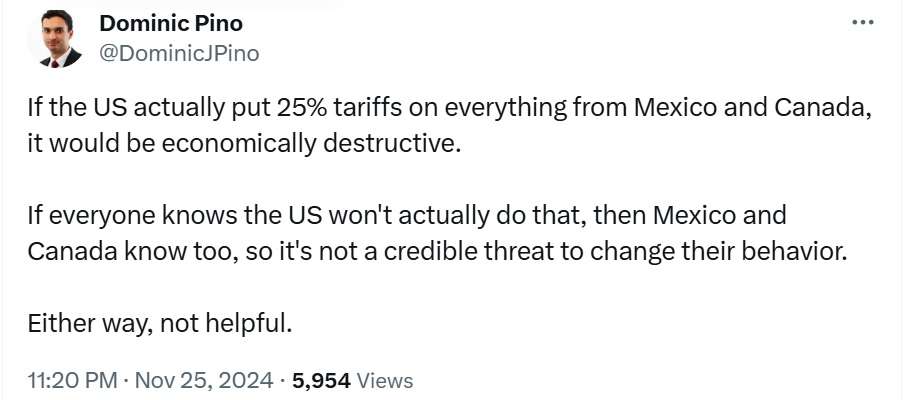 (Source: X.com (https://x.com/DominicJPino/status/1861263707868713009))
(Source: X.com (https://x.com/DominicJPino/status/1861263707868713009))
In Memoriam: Fred Smith, the quirky and brilliant founder of the Competitive Enterprise Institute (CEI), passed away on Saturday night.
"He was gregarious, whip-smart, stubbornly principled, and he was fun," writes CEI senior economist Ryan Smith in a tribute to his former boss. "Everybody in Washington knew Fred, and Fred knew everybody. Even people who disagreed with everything he stood for couldn't help but like him. He was always smiling and laughing, even when making serious intellectual arguments. People around him couldn't help but take on some of his joy. Fred was a Washington institution, in a good way."
Many in the free market movement owe their jobs and inspiration to Smith. For those of us, like myself, who never worked directly for Smith or CEI, his reputation (and that of his wife Fran, who lives on) was always larger than life. That part won't change.
QUICK HITS
President Joe Biden wants to have Medicare and Medicaid cover the cost of new anti-obesity drugs, which would make about 7.4 million older and poorer Americans eligible to receive those prescriptions. The incoming Trump administration will have to approve the change before it becomes official. Special Counsel Jack Smith filed motions on Monday to drop all charges against President-elect Donald Trump for his role in trying to overturn the 2020 election, as well as in the case about Trump possibly mishandling of classified documents. Spain is going to spend $22 billion to shut down its nuclear power plants, which seems like an expensive way to get less energy. After more than two months in prison, Backpage founder Michael Lacey has been released on bail while he appeals his conviction for money laundering. However, two of Lacey's colleagues must remain behind bars during the appeal process, a federal judge ruled.The post Return of the 'Tariff Man' appeared first on Reason.com.




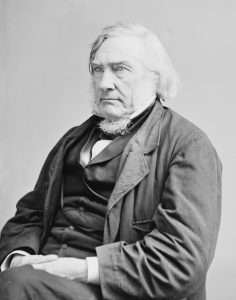







 Bengali (Bangladesh) ·
Bengali (Bangladesh) ·  English (United States) ·
English (United States) ·